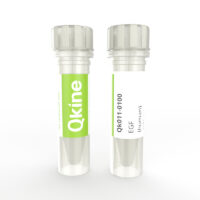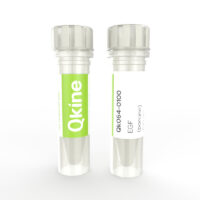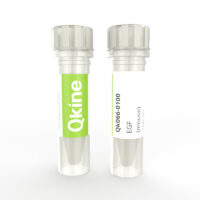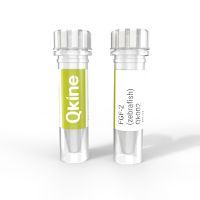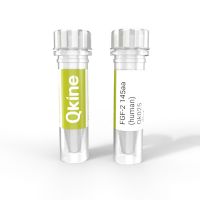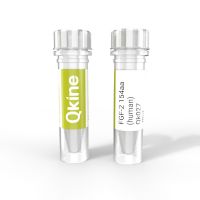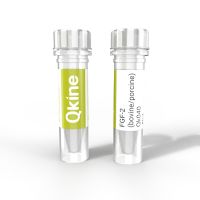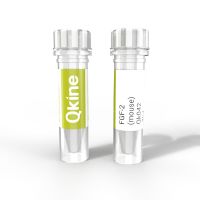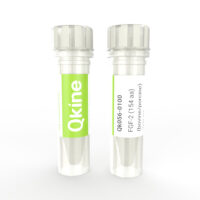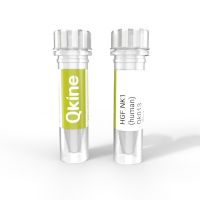- Human EGF protein is a potent EGF-family growth factor used in many human and mouse organoid and stem cell culture systems including intestinal and tumor (cancer) organoid culture.A pure 6.3 kDa biologically active mature human epidermal growth factor. Our recombinant EGF protein is manufactured to the highest purity in E. coli and extensively tested, making it ideal for use in chemically defined iPSC, ESC and organoid culture media.
- Porcine EGF is an essential growth factor belonging to the Epidermal Growth Factor family that stimulates the proliferation and differentiation of cells. It is used for the differentiation of induced pluripotent stem cells (iPSCs) and embryonic stem cells (ESCs) towards epithelial, neural, mesoderm and hematopoietic lineages. Porcine-EGF is becoming rapidly adopted as a species-specific growth factor in the cultivated meat sector. Porcine EGF is also an essential component of many organoid media supporting the culture and differentiation of a wide variety of organoids including intestine and liver organoids.Porcine EGF has a molecular weight of 6.3 kDA. This protein is animal-free, carrier protein-free, His-tag-free and non-glycosylated to ensure a pure recombinant protein with exceptional lot-to-lot consistency.
- Epidermal growth factor (EGF), a member of the EGF family of proteins, plays a significant role in regulating cellular processes such as cell growth, proliferation, differentiation, development, and tissue homeostasis. It is an essential growth factor in many stem cells and organoid culture media.In cell culture, mouse EGF is crucial for stem cell maintenance, proliferation, differentiation, organoid culture growth and survival. It is also widely used for disease modelling, drug screening, tissue engineering, and regenerative medicine. Overall, EGF is a key player in cellular regulation and functions.Mouse EGF is a high purity protein with a molecular weight of 6.1 kDA. This protein is carrier-free and tag-free to ensure its purity with exceptional lot-to-lot consistency. Qkine mouse EGF is suitable for the culture of reproducible and high-quality stem cells and various tissue-specific organoids.
- Zebrafish FGF-2 protein (bFGF/basic FGF) has been used extensively to support the maintenance and proliferation of human and mouse induced pluripotent (iPSC) and embryonic stem cells (ESC); used in the original Ludwig et al feeder-free culture of embryonic stem cells protocols 1-3. High purity 17 kDa FGF2 / bFGF protein, animal-derived component free (ACDF) and carrier-protein free (CF). This version of recombinant zebrafish FGF2 is used by the core facility at the Cambridge Stem Cell Institute, UK and historically by many of the stem cell groups based at University of Cambridge.
- Human FGF2 /bFGF protein (145 aa) is our gold-standard and recommended FGF2 / bFGF protein for induced pluripotent stem cell (iPSC) and embryonic stem cells (ESC) maintenance, and induced pluripotent and mesenchymal stem cells proliferation and differentiation.High purity and bioactivity 17 kDa FGF2 / bFGF protein, animal-derived component free (ACDF) and carrier-protein free (CF) comprising the core structured region (145 amino acids) sufficient for full biological activity.
- Recombinant human FGF2 protein (154 aa) is a highly bioactive, long–form of human fibroblast growth factor 2 protein. FGF-2 protein is used to support the maintenance of human embryonic stem cells and proliferation and differentiation of induced pluripotent and mesenchymal stem cells. This 154 aa form of FGF-2 comprises the core structured region and N-terminal extension.High purity and bioactivity 17 kDa FGF-2 / bFGF protein, animal-free (AOF) and carrier-protein free (CF).
- Recombinant bovine/porcine FGF2 protein 145 aa (bFGF/basic FGF) for the development of species-specific bovine (cow) and porcine (pig) cellular agriculture protocols and veterinary research applications. Used in comparative cell culture media optimization studies alongside Qk056, the 154aa form of porcine/bovine FGF-2.FGF-2 is used extensively in the maintenance and proliferation of induced pluripotent (iPSC) and embryonic stem cells (ESC)1-3 and for enhancement of proliferation in primary cell culture.High purity 16 kDa FGF-2 / bFGF protein, animal origin-free (AOF) and carrier-protein free (CF).
- Recombinant mouse FGF2 protein/ bFGF is an important factor in the maintenance of mouse epiblast-derived stem cells (EpiSC). Mouse naïve pluripotency is maintained by LIF, BMP4, and Wnt signalling pathways. However, the primed state of pluripotency in mouse EpiSCs is more similar to hESC and hiPSC, being maintained by FGF2 and TGFβ/Activin/Nodal pathways.1,2High purity and bioactivity 16 kDa murine bFGF / FGF2 (basic FGF) protein, animal-origin free (AOF) and carrier-protein free (CF).
- Recombinant bovine/porcine FGF2 protein 154 aa (bFGF/basic FGF), this is the long form of FGF-2 used for the development of optimized serum-free culture media for species-specific bovine (cow) and porcine (pig) cultivated meat and veterinary research applications. Used in comparative media optimization studies with Qk040 porcine/bovine FGF-2 145 aa.FGF-2 is used extensively in the maintenance and proliferation of induced pluripotent (iPSC) and embryonic stem cells (ESC)1-3 and for enhancement of proliferation in primary cell culture.High purity 16 kDa FGF-2 / bFGF 154 aa protein, animal origin free (AOF) and carrier-protein free (CF).
- Hepatocyte growth factor (HGF) is a multi-functional cytokine that promotes the growth and proliferation of various cell types including mesenchymal, endothelial, and epithelial cells. It is involved in embryonic development, cell motility, survival, angiogenesis, and tissue regeneration. In cell culture, HGF is used to promote the differentiation of mesenchymal cells towards hepatocytes, osteocytes, and endothelial cells. Recombinant human HFG NK1 protein is a potent naturally occurring isoform of HGF. This protein is animal-free, carrier protein-free, and tag-free to ensure its purity with exceptional lot-to-lot consistency with a molecular weight of 20 kDa. It promotes efficient differentiation of human induced pluripotent stem cells to hepatocyte-like cells at just 10 ng/ml with highly homogeneous expression of the hepatic marker, HNF4α.
